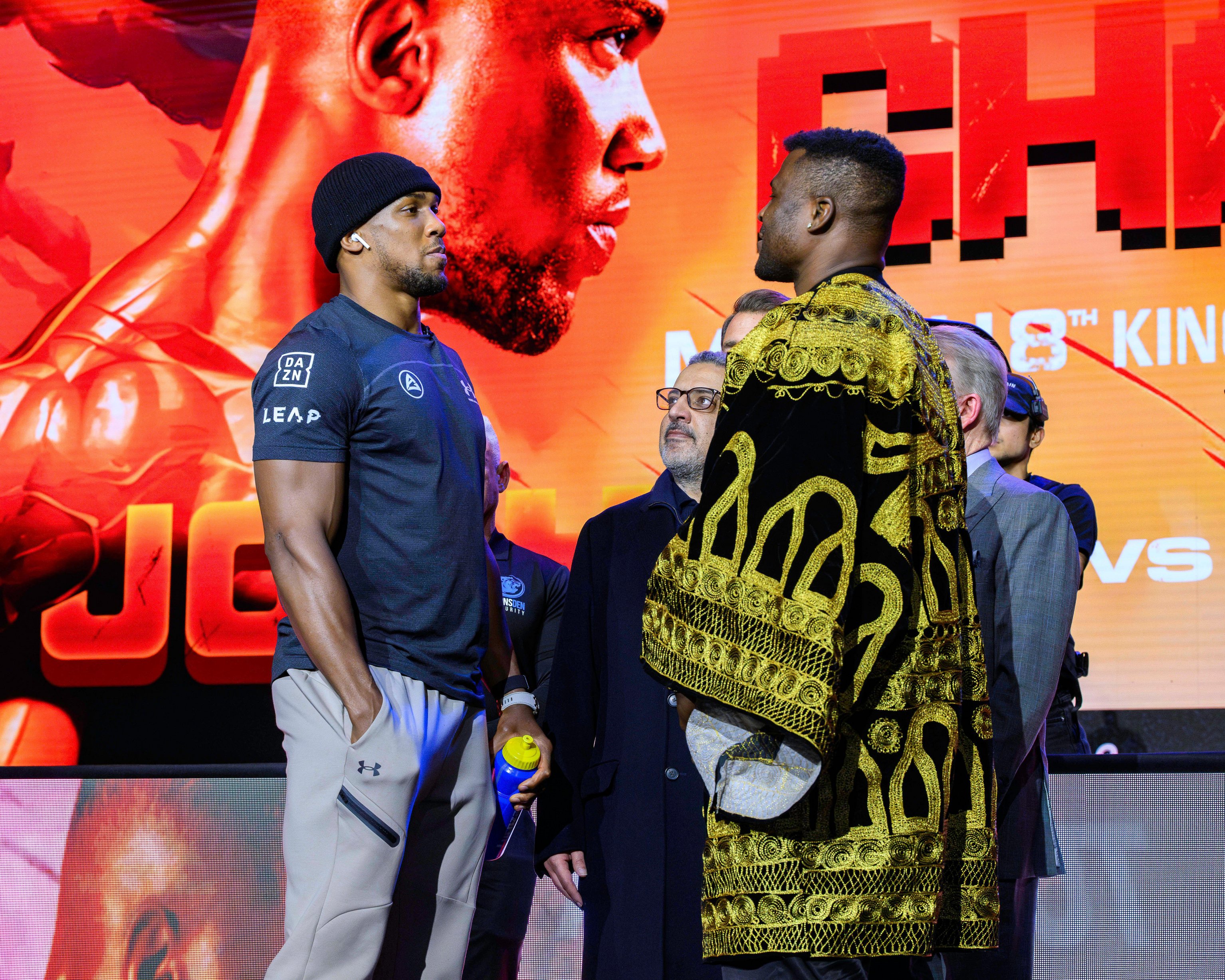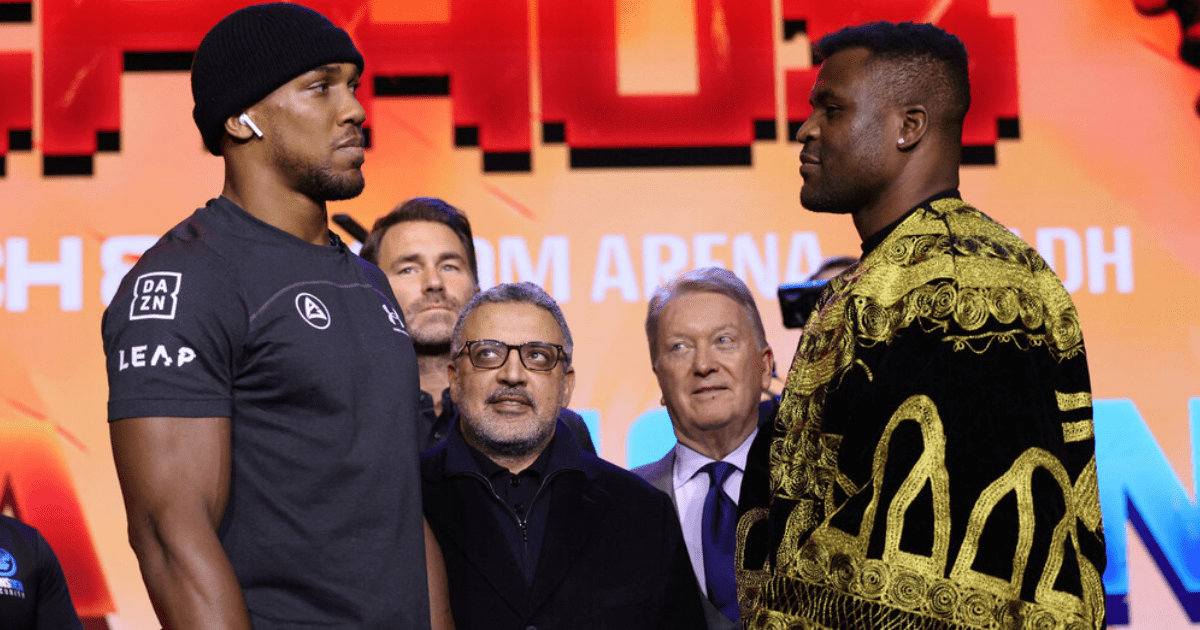Fury Stays Neutral
Tyson Fury is not taking sides in the upcoming fight between Anthony Joshua and Francis Ngannou, despite the winner being lined up to face him next. The former heavyweight champion is keeping a neutral stance ahead of the high-stakes showdown.
Not Interested in the Outcome
Fury expressed his indifference towards the outcome of the Joshua vs. Ngannou fight, stating, "I don't know [how that fight goes] and I don't care, to be honest." He believes that the best man will win on the night, acknowledging the unpredictability of heavyweight clashes.
Recognizing a Good Fight
Although Fury may not be invested in the result, he acknowledges that the Joshua vs. Ngannou bout is likely to be entertaining. He described it as a "great fight" and emphasized that styles make fights, hinting at the excitement the matchup may bring.
Looking Ahead to His Own Battle
While Fury refrains from taking sides in the upcoming fight, he remains focused on his own upcoming battle. Set to face Oleksandr Usyk for the undisputed heavyweight title in May, Fury is determined to reclaim his position as the top fighter in the division.

Frequently Asked Questions
How important is physical fitness in professional boxing?
Professional boxing requires a high level of physical conditioning. The sport requires high levels of speed, strength, endurance, agility, and endurance. Professional boxers should follow a tailored fitness plan that includes aerobic and aerobic workouts, strength and endurance training, and flexible exercises. Boxers’ ability to perform and train effectively in the ring will be compromised if they do not have superior physical condition.
What type of diet is best for a beginner boxer?
A novice boxer needs to follow a balanced nutritional diet that will fuel intense workouts while promoting recovery. The general recommendation is to eat a combination of carbohydrates and proteins for energy. Lean protein helps repair and grow muscles, while healthy fats are good for your overall health. Hydration, vitamins, and minerals are critical as well. Consulting a sports nutritionist to develop a diet plan that is tailored for the boxer’s weight class and training schedule can be beneficial.
What is required for a professional boxer to begin?
Equipment essential for those who want to get into professional boxing include boxing gloves, mouthguards, headgears (for sparring) and the right footwear. A heavy bag, speed bag, double-end bag, and other training aids are important for technical workouts. It is essential to use equipment that provides protection and durability. Otherwise, you may increase your risk of injury.
How important is mental strength in professional boxing?
Mental toughness is as vital as physical conditioning in professional boxing. The sport requires mental toughness, resilience, and the ability of handling pressure. Mental preparation is a combination of stress management, visualization and a strong mentality to meet the challenges that are faced in the ring. A boxer without mental toughness may find it difficult to perform well under the extreme conditions of a professional competition.
How do amateurs progress to professional boxers?
In order to transition from amateur boxing into professional, there is a major increase in the intensity of competitions, training and mental prep. A boxer who wants to become a professional must have a solid track record. This is usually achieved by competing in local and national competitions. A professional boxing licence is essential, as are experienced managers and coaches who can help guide your career and secure professional bouts.
What are key elements of a fighter’s training regimen?
The training regimen of a boxer is usually composed of several important components. This includes technical skill development and tactical drills. It also includes strength and condition, sparring sessions, and mental prep. The tactical drills will help you develop your fight strategy. Technique-focused training improves punch accuracy, defensive maneuvers, and defensive techniques. Sparring allows for practical combat experience. Conditioning exercises boost athleticism. Mental training helps build confidence, focus, resilience and resilience.
What qualities should a person look for in a trainer or coach of boxing?
If you are looking for a boxing trainer or coach, look for someone with experience, who has a proven track record of success, has a similar coaching style and a thorough understanding of both the technical and strategic elements of the sport. A good coach will also stress safety, conditioning and personal growth. A coach that motivates and communicates well is important in order to achieve your full potential.
Statistics
- Approximately 80% of professional boxers start their career in the amateur ranks before transitioning to the professional level.
- As per recent surveys, only about 17% of professional boxers reach a title shot opportunity in their careers.
- An analysis of boxing injuries suggests that 90% involve the head, neck, and face, emphasizing the importance of protective gear.
- Nutrition experts emphasize that over 70% of a boxer’s diet should focus on carbohydrates and proteins for energy and recovery.
- Reports suggest that successful professional boxers can earn upwards of 50 times more than the median purse for entry-level professionals per fight.
- Research shows that a boxer’s reaction time is typically under 0.25 seconds, honed through repetitive drills and sparring.
- Professional boxers typically train 4 to 6 hours per day, 5 to 6 days a week, depending on their fight schedule.
External Links
sweetsciencefitness.com
teamusa.org
ringtv.com
boxingscene.com
precisionstriking.com
proboxing-fans.com
titleboxing.com
How To
How to Develop Strong Boxing Footwork
Professional boxers must have a strong footwork to be successful. Improve your footwork by starting with balance exercises that improve stability. To improve your coordination and foot speed, use agility ladders. You can refine your movements by shadowboxing before a mirror. Jump rope exercises will improve your rhythm and endurance. Regular sparring sessions can also help you gain practical experience on how to move effectively around the ring when under pressure.

